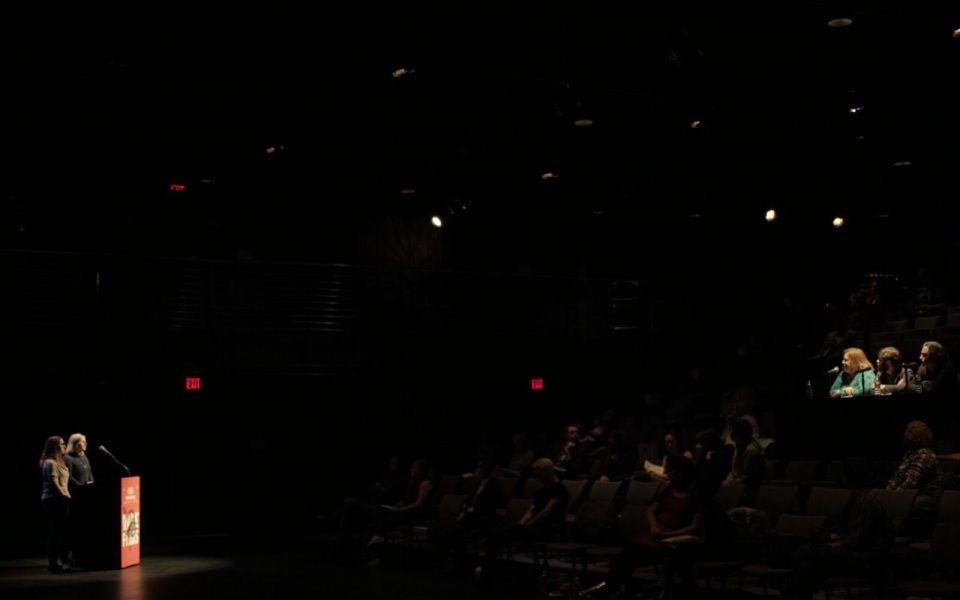Under a bright light in an otherwise dark room in Winston-Salem’s Hanesbrands Theatre, Aaron Lovett paused, considering a juror’s question.
“How are you going to reconcile with the fact that the left won’t really want to see it, and the right won’t really want to see it?” Jeremy Workman had asked.
Jurors and audience members at RiverRun International Film Festival’s April 7 Pitch Fest had watched a trailer for Lovett’s “Gays for Trump?” — a short documentary in the making. Lovett’s pitch was one of four that composed this year’s Pitch Fest, a competition in which student filmmakers from universities around North Carolina had five minutes to present their films, including a 90-second video clip. A 10-minute Q&A with three jurors — professional filmmakers Workman, Amy Schumaker and Jeff Reichert — followed each presentation. The winner would receive a cash prize and recognition within the industry.
Lovett, a student at UNC-Chapel Hill, responded to Workman’s query by acknowledging the challenge he undertakes in making this film. But neither its polarizing nature nor his own conservative upbringing has stopped him.
“I’m invested in the idea that dialogue can fix things,” Lovett said.
“Gays for Trump?” follows Peter Boykin and David Smith, an interracial gay couple, as well as their friend Scott Presler, as the three campaigned for the Republican presidential candidate. Despite only 14 percent of LGBTQ Americans supporting Donald Trump, Boykin, Smith and Presler campaigned to support Trump’s promises to defend the country and the jobs of its citizens.
Lovett told the jurors he expected the film to run 15 to 18 minutes once completed, adding that he didn’t feel he has the talent or resources to make it a feature-length project.
Preceding Lovett’s presentation, Mariah Smallwood and Rebecca Firth — both from UNC-Wilmington — pitched their film “Circles,” which explores the acts of women shaming one another from ages 15 to 71.
“Is there any resolution or transformation at the end?” Schumaker asked during the Q&A, having seen only the 90-second clip of what would be a 13-minute film.
Smallwood and Firth answered that resolution came from the perspectives of those in the older age groups and the lessons they’ve learned through hindsight.
Following “Gays for Trump?,” Stan Wright from Wake Forest University pitched his film “Mother,” which explores the opioid crisis in the United States and its effect on the motherhood of women struggling with addiction. Every 19 minutes, Wright said, a baby is born in the United States to a mother with an opioid addiction, and those babies are often taken away from the mothers. Like the other films, Wright considered his an observational character study whose topic takes a glance at larger social issues.
When a juror raised the possibility of a “poverty porn” criticism when considering the film’s subjects, Wright responded that he hopes the film engages not through schadenfreude, but rather through the commonality of having children.
Finally, Julie Chernesky and Kaitlyn Ali from UNCSA presented their film “War Paint,” a documentary that examines the world of drag queens, particularly in the American South. Chernesky and Ali hope to explore the effects of Southern culture on the drag scene and to give voice to queens in a time of political turmoil in North Carolina.
During the Q&A session, Reichert asked how attached the filmmakers were to the title. For Reichert, the Southern aspect sets “War Paint” apart from other drag documentaries he’s seen.
“If you can announce [the Southerness] in your title, that will really intrigue audiences,” he suggested.
The film remains largely in pre-production, as Chernesky and Ali search for a drag queen who could provide a minority’s perspective.
The jurors deliberated during lunch, after which the winners were announced.
Due to the quality of the film up to this stage, as well as Lovett’s sharp, deliberate presentation, “Gays for Trump?” won first prize.
Jurors voted Wake Forest’s Stan Wright and his film Mother as the runner up, a fitting recognition for a well-developed project that so far has succeed in translating an American crisis onto the screen.
Join the First Amendment Society, a membership that goes directly to funding TCB‘s newsroom.
We believe that reporting can save the world.
The TCB First Amendment Society recognizes the vital role of a free, unfettered press with a bundling of local experiences designed to build community, and unique engagements with our newsroom that will help you understand, and shape, local journalism’s critical role in uplifting the people in our cities.
All revenue goes directly into the newsroom as reporters’ salaries and freelance commissions.


Leave a Reply